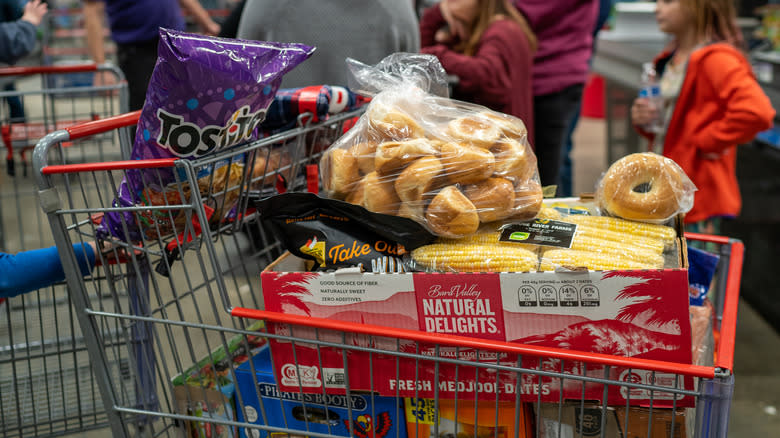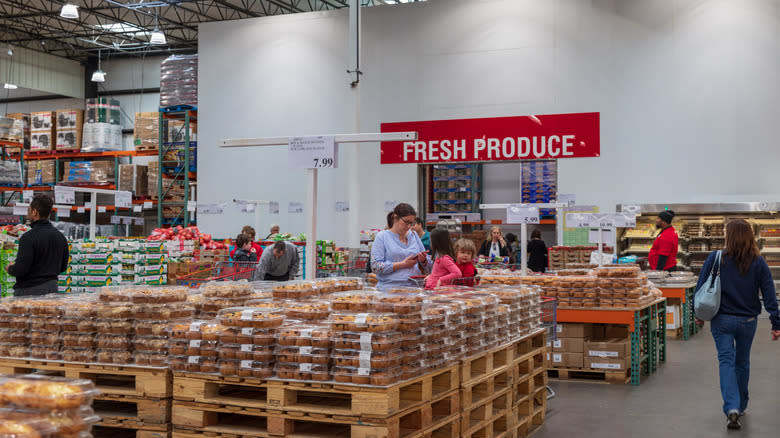What It Means To Plant Weeds During A Costco Trip (And Why It's So Annoying)

Costco shoppers and employees across multiple locations are upset over finding "weeds" around the big-box store, but they're not talking about gardening. Just as real-life weeds grow somewhere unwanted, "weeds" in a store are items that are out of place. "Planting weeds" is the practice of leaving trash or random items around a store where they don't belong. Why is this so annoying? According to self-proclaimed Costco employees online, one of the biggest reasons is wastefulness.
If a customer changes their mind about buying a rotisserie chicken already in their cart and leaves it snuggled between a few sweaters, what do you think happens to that chicken when it's found? Since it's hot food and there's no way of knowing how long it's been sitting there, an employee will likely have to throw it away. This comes from an alleged Costco worker who responded to an upset shopper's Reddit post with pictures of weeds left around their local store: large cartons of eggs left on top of a trash can, mandarin oranges left on top of some pajamas, and grapes and strawberries on a stack of shoe boxes. According to the employee, perishables left around their Costco, like steak, are tested for temperature and are only returned if they're still in the safe zone. Most folks in the thread seemed to agree that leaving perishables around the store is not only annoying but extremely wasteful.
Read more: All The Benefits Of A Costco Membership
Weeds Are Wasteful, Messy, And Extra Work For Employees

Besides the waste caused by shoppers leaving perishables in random places, planting weeds is also detrimental to a store's aesthetic and creates more work for the employees. In other words, the practice makes a mess and assumes employees should go to any lengths to clean up after customers. As Reddit users pointed out in the frustrated shopper's thread, weeds don't just happen in Costco, they happen in all stores — Walmart, Target, and Home Depot were mentioned as other examples. One annoyed user said, "There are people out there that seriously think it's your job as a retail employee to pick up after them. I know of children that have better clean up skills."
Leaving weeds also creates the potential for items, particularly perishable ones, to stain or ruin other products. For example, when discussing one of the post's photos, one user pointed out that mandarin oranges can be leaky, and the pictured bag may have stained the clothes underneath. Another person claimed that a shopper left an 18-pound brisket on top of a pile of socks at their local Costco.
What Can Costco Do About Weeds?

The jury is still out on what the consequences for leaving weeds should be — if there should be any at all. Some Redditors suggested that the store implement a new policy or that the Costco memberships of shoppers caught planting weeds should be banned. According to a self-proclaimed employee, their store has no policy against leaving items in random places throughout the store. When asked what they would do if they saw someone set a steak down in a non-refrigerated area, they responded, "If I saw a member set it down I'd say, 'Oh, let me take that back to the fridge for you,' so basically nothing."
As another person pointed out, however, enforcing such a policy would be difficult, and Costco likely doesn't want to lose customers, despite some people's lazy or rude shopping habits. Still, grocery stores often do have policies about throwing out perishable products that have left the store. One Costco shopper in the Reddit thread described an incident in which they reached the parking lot before realizing they bought a frozen item they didn't need; when they attempted to return it, staff allegedly told them the item would have to be thrown out for sanitary and food-safety reasons. Of course, accidents happen and shoppers are allowed to change their minds, but most folks seem to agree that it's better to leave unwanted items with the checkout clerk than to leave them somewhere in the store.
Read the original article on Daily Meal.
